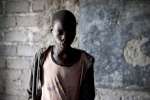- Text size
 |
|  |
|  |
| 
- عربي
UNHCR head "extremely enthusiastic" after meeting leaders of Afghanistan
News Stories, 15 May 2015
KABUL, Afghanistan, 15 May (UNHCR) – The UN High Commissioner for Refugees António Guterres praised the new Afghan government's commitment to solving the problems of internal displacement and re-integrating returning refugees, terming it crucial for the entire region.
Guterres, making his fifth trip to the country, met on 12-13 May with the UN refugee agency's partners in the government, the international community and UN as well as members of its own staff to discuss the situation of returnees in Afghanistan, internally displaced people (IDPs) and recent refugees from Pakistan who Afghanistan is hosting.
UNHCR in Afghanistan is facing a significant increase in returnees, alongside a rise in internally displaced persons from continuing emergencies and Afghanistan's first-ever refugee crisis in southeastern Afghanistan. The challenges were underlined by an attack on a Kabul guesthouse while Guterres was in the capital that killed at least five Afghans and nine foreigners.
Despite the problems, the High Commissioner noted the opportunities in this critical first year of the new government. The Ministry of Refugees and Repatriation, with UNHCR support, is preparing a strategy for voluntary repatriation and reintegration of Afghan refugees. Afghanistan, in collaboration with Pakistan and UNHCR, plans an enhanced repatriation assistance package.
In addition, the Afghan government is developing a list of projects to support returnee reintegration. For the first time, Afghanistan has become a refugee hosting country and is considering a refugee law.
"This has been my most positive visit, and I am extremely enthusiastic about the commitment by the government of Afghanistan," Guterres said. President Ashraf Ghani told the High Commissioner that he wanted to see the problem of IDPs totally ended while Chief Executive Officer Abdullah Abdullah pledged full support for UNHCR's work.
"On this visit I am excited and optimistic as there is a President, Chief Executive Officer and government truly committed to dealing with the problems of reintegration and displacement … this is not just important for the people but the neighboring countries as well."
The Afghan deputy foreign minister, Hekmat Khalil Karzai, said after his meeting with Guterres: "The new government has resolved to solve issues; if it cannot solve issues it will set the foundation to address them."
Guterres, in meetings with Minister of Refugees and Repatriation (MoRR) Sayed Hussain Alimi Balkhi and Minister of Rural Rehabilitation and Development (MoRRD) Nasir Ahmad Durrani, discussed the importance of increasing access to land, shelter and livelihoods, while also addressing urbanization.
The High Commissioner said "We have been talking with MoRRD and MoRR to use their capacity and synergies to translate the political initiatives and strategies into action and generate goodwill to help support Afghan communities in Pakistan and Iran."
The High Commissioner said creating an environment conducive to return -- with employment opportunities, basic services and the chance to be self-sufficient -- will help UNHCR to preserve asylum space for Afghans still living abroad. UNHCR is working to ensure the needs of returnees, refugees and IDPs are including in regional and national programmes.
Maya Ameratunga, UNHCR's representative in Afghanistan said: "Next week, UNHCR together with the Islamic Republics of Afghanistan, Iran and Pakistan will host a Quadripartite meeting to discuss the Solutions Strategy for Afghan Refugees, a joint resource mobilization effort for the enhanced return and reintegration package, and the importance in ensuring return is voluntary, dignified, safe and gradual in order to be sustainable."
The High Commissioner emphasized UNHCR's continued commitment to the people of Afghanistan, noting that UNHCR began working with Afghan refugees in the late 1970s. He announced that UNHCR's annual Executive Committee meeting will feature the Afghan refugee situation as its High Level Segment in order to focus awareness on the issue,
This year more than 24,000 Afghan refugees have voluntarily returned home with UNHCR assistance. Since March 2002, when the current voluntary repatriation operation was launched, some 5.8 million Afghans have repatriated from Pakistan, Iran and other asylum countries, in the world's largest repatriation operation.
UNHCR, as co-chair of the IDP Task Force, is also coordinating the assistance to some 850,000 internally displaced people and is supporting Afghanistan in giving asylum to some 200,000 refugees.
By Marguerite Nowak in Kabul









































